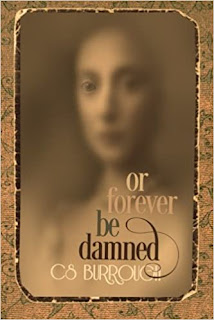It was my great pleasure being interviewed by UK writer T E Taylor ...
Welcome, Colin! Tell us about your novel, Or Forever Be Damned.
It's an historical saga spanning eight decades, following the lives and families of two very different women who escape the slums of northern England’s ‘Cottonopolis’, Salford in the 1930′s Slump. Mona — a poor but respectable Protestant teenaged factory girl, is tormented by sibling rivalry over her favoured artistic younger brother, Ambrose. Untrained and against parental orders, stage struck Mona resolves to outshine Ambrose, furtively pursuing a theatrical career. Into her journey, Mona unearths her younger bête noire, Kat — a Catholic rough-diamond child-veteran entertainer who, conversely, yearns to escape theatre life. So begins their lifelong enmity — a simmering irrational enmity that lives on in modern day Australia.
What was idea that led you to begin writing the book?
I've always loved the great historical fiction classics, including family sagas, and thought it a shame, as trends change, seeing them phased out, shelved for posterity. Most popular contemporary fiction – crime, sci-fi, fantasy, whatever – does little for me as a reader, so I'd feel a fraud as a writer, producing what I won't consume. I'd met countless classic saga fans who felt similar: browsed library shelves becoming dismayed, having exhausted this special genre of yore. I thought, if nobody else will top up supplies, why not me? The challenge nagged at me for ages before I caved in and took it on. I've also, from decades of consuming historical non-fiction, acquired knowledge of various periods, which felt unused, sitting in my head. My passion for historical trivia needed expression. Then there was my weird theatrical background, which others were fascinated with. As a storyteller it made sense to combine these two fields at some point.
How far does the novel draw upon your own experience?
Very little. Like everyone, I have family experience, geographical experience and professional experience, which came in useful, but this story covers mostly times and places I didn't inhabit. The characters are entirely created, not drawn from those in my life.
You have been writing since 1989. Would you like to say a little about your earlier work?
When I first left England, many years ago, someone suggested I keep journals of my first impressions of places, to reflect on, in hindsight. I travelled extensively with my theatre work and spent many hours in trains, boats and planes, watching foreign places whizz past, passing my time just thinking and writing. After some years I had all these written words and had developed a skill I liked using. I did journal articles, weekly columns, essays, short stories, novellas, and along the way my memoirs. I think all those writing stages needed to unfold to get me to this one. I just kept going, doing whatever came next, it wasn't a planned, structured vocation. A lot never reached publication, and some is listed at AustLit:
What writing projects to you have planned or in progress at present?
I'm tied up with this novel's release, which is in two phases. The eBook was released just weeks ago, and the paperback is out in coming weeks. I'm not ruling out spinoffs or sequels but have no time yet to plan anything. I'll stay with literary fiction though. A book of short stories really appeals to me. Also, a screenplay of one of my favourite classic novels is a far-off dream, but I'd rather not say which, I might jinx myself.
How do you plan and organise your writing – any tips?
It starts with some character entering my head, in some situation. Then I do rough sketches, pastiches, let it evolve spontaneously. Only when I see a basic outline forming do I draft a short, rough plot outline. I resist predetermining the conclusion, the situations are driven by the characters' decisions as I write. I then rewrite everything many times from start to finish. I start this by condensing the word count until it's a tight as possible without losing mood, style or cadence. Then I reread and rewrite, over and over. I wake at strange hours and jot down insertions and adjustments that come in my semiconscious states. Hard plotting from the outset is my literary death – I leave that for the fast-fiction industrialists.
You have had a career in the performing arts. Is this still a part of your life?
No. I grew up in theatre, trained full-time in Performing Arts, then worked for a long time in the business until I craved different experiences. That world demands all of you, there is no other life when you're there. It remains an ingrained part of me though, and will always be in me.
Do you have any other talents or interests that you would like to share with us?
I'm fascinated with English history, hated it at school, maybe it's a nostalgia thing. I also love animals, sunshine and beaches. And I still travel when I can.
As someone brought up in Britain who has lived for many years in Australia, do you consider yourself British, Australian, or a bit of both?
I'm a British-born Australian, a citizen of both and equally proud of both.
What question would you have liked me to ask that I didn’t?
Why do you keep writing?
And what is the answer?
Dogs bark, drunks drink, writers write.
Many thanks for those insights, Colin, and good luck with the book!







